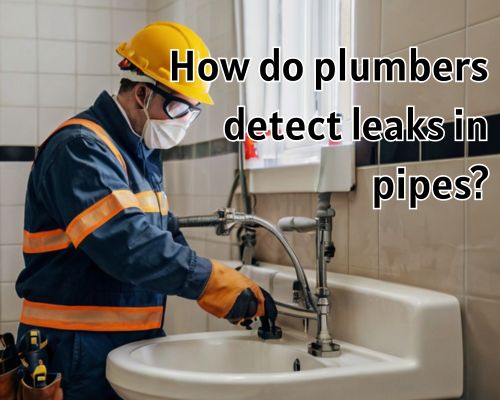
How Do Plumbers Detect Leaks in Pipes? A Local Guide for Homeowners in Warragul, Australia
If you’ve ever experienced an unexplained spike in your water bill or noticed damp patches on your walls or ceilings, you may be dealing with a hidden plumbing leak. In towns like Warragul, Australia, where both heritage homes and newer developments coexist, plumbing issues such as concealed leaks are surprisingly common. But how do plumbers detect leaks in pipes, especially when the problem isn’t visible? With Dean Owens of Plumber Warragul, we’ll dive into the modern methods professionals use, what local homeowners should look out for, and how plumbing leak detection works within the Victorian building codes and Australian standards.

🚿Why Leak Detection Matters in Warragul
Warragul, part of the West Gippsland region, faces a variety of environmental conditions—ranging from humid summers to chilly, wet winters. These fluctuations can place stress on plumbing infrastructure, especially in older homes with ageing copper or galvanised steel piping. Left unchecked, even a small leak can escalate into significant water damage, leading to mould growth, structural rot, and expensive repairs.
Additionally, under Section 4.1 of the Victorian Building Authority (VBA) regulations, homeowners are responsible for ensuring plumbing systems are maintained in good condition. This means early leak detection isn’t just smart—it’s also legally prudent.
🔍Top 7 Ways Plumbers Detect Leaks in Pipes
When the leak isn’t visible, plumbers employ a mix of advanced technology and hands-on diagnostics. Here are the most common methods used in and around Warragul:
1. Acoustic Leak Detection
Using sensitive microphones and headphones, plumbers can “listen” for leaks. The sound of water escaping from a pipe under pressure is often distinctive. Devices like the Ground Microphone or Listening Disc help detect leaks under concrete slabs or behind walls—common in Warragul’s post-war housing stock.
📍Local Insight: In some older Warragul properties with slab-on-ground foundations, this method avoids unnecessary invasive work like ripping up flooring.
2. Thermal Imaging Cameras
Also known as infrared thermography, this technique visualizes temperature differences. A leaking pipe behind a wall or under a floor often causes a cold spot due to evaporating water. Thermal cameras are ideal for spotting leaks in concealed hot water or central heating pipes.
💡SEO LSI Keywords: infrared leak detection, thermal imaging plumbing, pipe moisture sensor
3. Pressure Testing
For closed plumbing systems (like heating circuits), plumbers can isolate and pressurize the system. A pressure drop indicates a leak. This method is frequently used during pre-sale building inspections in Warragul to confirm plumbing integrity.
4. Tracer Gas Detection
In this high-tech approach, a non-toxic gas (usually hydrogen or nitrogen) is pumped into the pipes. The escaping gas travels through the smallest cracks and is detected above ground using a gas detector wand. It’s extremely effective for detecting underground leaks or pipe faults in difficult terrain, common in semi-rural areas around Warragul.
5. Dye Testing
Non-toxic dye is flushed through the system, and if it appears in an unintended area (e.g., walls or ceilings), it pinpoints the leak. This is commonly used for roof plumbing, guttering, and stormwater systems.
6. CCTV Drain Camera Inspection
For drain and sewer pipe leaks, plumbers insert a flexible camera to inspect the internal pipe condition. This method is particularly effective for detecting tree root intrusion, a recurring issue in leafy Warragul suburbs like Drouin and Nilma.
📍Local Relevance: Local plumbers often use drain cameras after heavy rains to inspect for cracks in clay stormwater pipes.
7. Moisture Meters & Humidity Sensors
Sometimes the simplest tools are the most effective. Moisture meters can identify damp areas behind walls, under floors, or in ceiling cavities, allowing for precise location of slow leaks. These are standard tools in Australian plumbing inspections.
🏡Common Leak Sources in Warragul Homes
Plumbers in Warragul often detect leaks in the following areas:
- Bathroom waterproofing failures (common in older tiled bathrooms)
- Roof flashing deterioration from seasonal weather extremes
- Hot water system leaks, especially from aged units
- Corroded galvanised pipes in heritage homes
- Irrigation and garden tap leaks, particularly in properties with sloping terrain
For plumbing needs, go to Plumber Warragul.
🧰DIY vs. Professional Leak Detection
While some homeowners may attempt leak detection themselves using food colouring in toilet tanks or checking meter readings, professional plumbers have the tools and expertise to diagnose hidden leaks efficiently and non-invasively.
📍Important Note: Under Victorian plumbing regulations, only licensed plumbers can legally repair most plumbing systems. In cases where the leak involves a gas line, sewer, or stormwater drain, DIY attempts can result in fines or voided insurance.
👨🔧Choosing the Right Plumber in Warragul
If you suspect a leak, hire a licensed and insured plumber in Warragul who is experienced with local plumbing codes and has access to advanced leak detection equipment. Reputable plumbers will also:
- Offer fixed quotes
- Provide inspection reports (helpful for insurance claims)
- Use non-invasive detection methods
- Be registered with the VBA
💡Tip: Look for plumbers who are certified to use WaterMark-approved products—this ensures compliance with Australian Standards and compatibility with local systems.
💸What Does Leak Detection Cost in Warragul?
Leak detection services in Warragul typically cost:
- $150–$300 for basic detection (e.g., moisture meter or visual inspection)
- $300–$600 for advanced thermal or acoustic methods
- $600+ for tracer gas or full system pressure testing
Prices vary depending on access, home age, and complexity.
✅Final Thoughts: Prevent Leaks Before They Start
Prevention is always cheaper than cure. Consider the following:
- Schedule annual plumbing inspections
- Replace aging pipework with PEX or copper alternatives
- Upgrade fixtures to WaterMark-compliant models
- Ensure stormwater systems are cleared before rainy seasons
Living in a regional area like Warragul doesn’t mean you should settle for less—plumbers in the area are equipped with modern tools and follow strict Australian Standards (AS/NZS 3500). If you notice signs like peeling paint, musty smells, or rising water bills, act quickly.
🔑TL;DR: How Do Plumbers Detect Leaks in Pipes?
Plumbers in Warragul detect leaks using a mix of tools like acoustic sensors, thermal cameras, pressure tests, dye tracing, and CCTV drain inspection. Early detection can prevent water damage, mould, and structural issues. Always hire a licensed plumber familiar with Victorian plumbing codes and equipped with modern leak detection technology.

